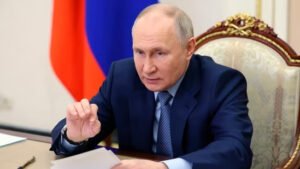![]()
Russia and China are helping each other expand their territorial reach, and democracies must push back against authoritarian states that threaten their rights and sovereignty, Taiwan’s outgoing foreign minister, Joseph Wu, said in an interview with The Associated Press.
Wu called on democracies to align in countering Russia and China’s military assertiveness in Europe, the South China Sea and beyond. China threatens to invade Taiwan, a self-ruled democracy that it claims as its own territory.
“Putin’s visit to Beijing is an example of the two big authoritarian countries supporting each other, working together with each other, supporting each other’s expansionism,” he said.
In particular, Wu called on Western powers to continue to support Ukraine in its fight against Russia to send a message that democracies will defend one another.
“If Ukraine is defeated at the end, I think China is going to get inspired, and they might take even more ambitious steps in expanding their power in the Indo-Pacific, and it will be disastrous for the international community,” Wu said.
Wu warned about the risk of a potential conflict in the South China Sea, a resource-rich area and key transit route for global trade, where China has overlapping territorial claims with several of its neighbors. The Philippines in particular has had numerous territorial skirmishes with China in recent months, some of which have led to minor collisions, injuring Filipino navy personnel and damaging supply boats.
Wu said tensions in the South China Sea are “more dangerous” than those in the Taiwan Strait, and they indicate China’s ambition to project power in the region.
“(China) wants the international community to focus on the Taiwan Strait and forget about China’s actions in different parts of the world,” Wu said. “And I think … we shouldn’t lose the vision that the expansionism of authoritarianism is everywhere in the Indo-Pacific.”
Wu said joint military drills between China and Russia in the region raise tensions in Japan and other neighboring countries. He also criticized Beijing’s strategy of pursuing security agreements with nations such as the Solomon Islands, a former Taiwan diplomatic ally, and increased military presence across Asia and Africa.
Wu said Taipei is committed to continuing a policy of maintaining peace and the status quo in relations with Beijing, as the island prepares to inaugurate its new president, Lai Ching-te, on Monday.
China claims Taiwan as its own territory, to be retaken by force if necessary, and maintains military and economic pressure on the island by sending warships and military vessels near it almost daily. China and Taiwan have had separate governments since the Nationalist Party, or Kuomintang, retreated to the island after losing a civil war to the Communist Party in 1949.
“We don’t provoke the other side of the Taiwan Strait, and we don’t bow to the pressure,” Wu said. “But at the same time, the policy approach from Taiwan is that we keep our door open for any kind of contact, dialogues or negotiations in between the two sides in a peaceful manner. And that door will remain open.”
He added Beijing is trying to change the status quo with Taiwan through a series of actions, including by ramping up military pressure, conducting information warfare and introducing new flight routes along the median line of the Taiwan Strait, an informal demarcation zone.
Wu said security pacts like those between the U.S., Australia and Japan, and the new AUKUS partnership between Australia, Britain and the U.S. serve to deter China from becoming even more aggressive in the region.
On Taiwan’s relationship with the U.S., Wu said he was confident Taipei will continue to have “very close” ties with Washington no matter who wins the November presidential election.
Wu, who once described his work as “probably the most difficult foreign minister job in the world,” will leave his post after six years and return to a previous job as secretary-general of the National Security Council. He will be replaced by presidential aide Lin Chia-lung. The outgoing diplomat said the Taiwan foreign minister job still comes with plenty of challenges.
China bars its diplomatic partners from having formal exchanges with Taipei, and during Tsai’s years in office, Beijing poached several of Taiwan’s diplomatic allies, bringing the remaining number down to 12.
Despite the losses, Wu has worked to improve unofficial ties with European and Asian nations and the U.S., which remains Taiwan’s strongest unofficial ally and is bound by law to provide the island with the means to defend itself. Delegations from several European countries have visited Taiwan in recent years, and Lithuania opened a trade representative office — a de facto embassy — in Taipei.
Wu said European nations have become more sympathetic to Taiwan’s cause and cautious of China due to a series of factors including China’s actions in the South China Sea, its human rights crackdowns in Hong Kong and Xinjiang, and Beijing’s handling of the coronavirus pandemic.
“Nobody should be … thinking that they are immune from authoritarian influence,” Wu said.







